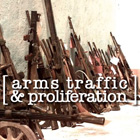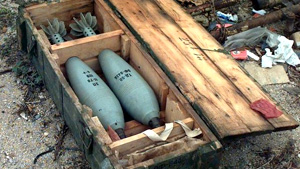
|
HUMAN RIGHTS GROUP SAYS 'OPAQUE CHAIN' OF PRIVATE INTERESTS INCREASING SHIPMENTS OF DANGEROUS ARMS, WITH LITTLE SUPERVISION 10 May 2006 Amnesty International (Amnesty/AI) has published a new report examining the international arms trade, and its findings indicate there is little control on the expanding web of private interests seeking to profit from a proliferation of dangerous weapons. The report also illustrates the ways in which this scattering of dangerous weapons has lead to severe human rights abuses. AI arms expert Brian Wood told the Reuters news service "Brokering is increasingly common, with main contractors sub-contracting supply, transportation and collection in an ever lengthening and increasingly opaque chain". The supply chain is slipping beyond the grip of international arms control law and regulatory agencies. His concern, as expressed in the report "Dead on Time: arms, transportation, brokering and the threat to human rights", is that this type of shady arms trafficking is stirring conflict and facilitating gross abuses of human rights, even as perpetrators are enabled to hide their caches from international bodies. The Amnesty report makes several suggestions for curbing the near rampant spread of small arms and military equipment to developing countries and conflict zones. Among these suggestions is a more uniform regime of arms control laws, beginning at the national level and meeting international standards based on a global treaty framework. It calls for "Making violations of UN arms embargoes a criminal offence in all states and in the case of serious violations, a crime with universal jurisdiction". Such a provision would mean that individuals serving in governments or linked to arms manufacturers could face charges in any country for violating any arms embargo anywhere. The principle is that without this sort of barrier to the spread of weapons, the motive to profit by circumventing international arms embargoes against corrupt or tyrannical regimes or against sending weapons into conflict zones would too easily (as it does not) find a way to serve its interests, endangering possibly millions of lives. Sergio Finardi of TransArms, which co-authored the Amnesty report, frames the problem this way: "It is clear that the existing patchwork of regulations are completely failing to keep pace with the expanding number and reach of international brokers, logistic firms and transporters. Such intermediaries may ensure that shipments of arms around the world arrive dead on time, but all to often they are used for the killing, rape, torture and displacement of hundreds of thousands of people". The report itself notes "Growing state-sponsored out-sourcing and the increasing private mediation of international arms distribution and procurement is adding to the risk of arms being delivered, diverted and used for grave human rights violations." There is, as is clear from the language and the findings of the report, serious concern that too much leeway has been given in the debate over the ethics of seeking to profit from conflicts where new arms shipments are often diverted or sent directly by private business. Brokering of arms deals, where existing contracts are renegotiated and resold to third parties not formally granted permission through regulatory channels to make a given purchase, is fueling the problem. As such, Amnesty calls for strict regulation of any situation in which intermediaries broker arms contracts or arrange for importation of weapons from another country, noting "The role of such intermediaries is increasingly integral to the global arms trade, especially to the 35 countries whose exports make up roughly 90% of the world’s arms trade." Central to the report is the issue of the 50 armed conflicts which have either begun or been continued during the last 15 years. AI notes "None of these conflicts could have lasted long without one or both of the opposing forces commanding and replenishing sizeable arsenals, usually relying on brokers and logistics agents to fix deals for the constant supply of ammunition and other military-related equipment, and the hiring of a functioning network of carriers able to deliver them." Civil wars, sectarian conflict, campaigns of ethnic cleansing and genocide, seizures of power, cross-border fighting, disputes over land and water and mineral resources, all require an upkeep of military-grade arsenals, and they all have contributed to brutal human rights violations, whether systematic or sporadic and random. Also noted is the effort to improve transport security in the United States and at its borders, in the wake of the attacks of 11 September 2001. The measures, according to this research, indicate that rigorous security measures are feasible and can be implemented on a large scale, without significantly slowing commerce or interrupting or dampening economic output. But, the authors note, the measures of the US government in this area have been designed to protect against unwanted devices entering the US, and they are not designed, as yet, to prevent materials which could contribute to human rights abuses crossing international borders. A significant factor in the matrix of arms traffic, legitimate and illicit, is the phenomenon of "grey markets", areas where laws are either lax or poorly enforced, so that legality may be called into question, but not clearly defined. These "grey markets" allow a subtle and complicated framework to emerge through which serious abuses become possible. Specifically, "failures to improve arms control laws and regulations" on the international scale, even as supply chains and the broader commercial arms trade have grown in complexity, have coincided with "A general lack of restraint in the official and corporate promotion of arms exports". This means that as opportunity has arisen to expand the scope and the complexity of the arms markets, and therefore to profit from the trade, both governments and private interests have been more successful in promoting opportunities to exploit that situation than they have in ensuring sound regulatory practices that allow legitimate trade while protecting human lives, civil society in the developing world, and human rights in general. Evidence cited by the report leads to the conclusion that legitimate commercial operations are, for the sake of efficiency, employing the same "specialized" services for transport, brokering and sales and distribution, that are employed in the "grey markets" which give way to plainly illegal trading. That integration of services then "enables some of them to mix as much as possible legitimate business (sometimes humanitarian aid to conflict zones) and 'grey market' business with illegal trafficking, in order to minimize the risk of seizures and law enforcement actions". The result is a chilling effect on law enforcement, because operations involved in entirely illegal business are —willingly or not— shielded by the standards of practice in the industry, a cloak that covers for otherwise suspicious brokering and delivery. Amnesty takes serious issue with the practice of layered sub-contracting to private service providers in a climate where enforcement is weak or non-existent, saying it is "dangerous" and can lead directly to serious crimes. The report also urges an effort to increase awareness of the problem. The organization's position on the issue of the burgeoning if shadowy industry is succinct and straightforward, and is stated clearly as follows: "Amnesty International is opposed to transfers of military, security or police (MSP) equipment, technology, personnel or training —and logistical or financial support for such transfers— that can reasonably be assumed to contribute to serious violations of international human rights standards or international humanitarian law. Such violations include arbitrary and indiscriminate killing, 'disappearances,' torture and other ill-treatment." Finally, citing logistic channels and specific incidences of questionable trade parameters, the report cites as isolated cases indicative of the larger problem: "Chinese and US arms routes to Nepal... Bosnian surplus arms supposedly to Iraq... Brokering arms to Colombia by US residents and nationals... Brazil arms for Saudi Arabia and Mauritius... European shipping arms for invasion of Iraq... [and] Dutch broker of Chinese arms for Liberia". There is no clear message from any one government on its involvement in any of these transactions or whether they are seen to contravene existing human rights treaties or war profiteering provisions of domestic laws. But the aim of the report seems to be to raise awareness among officials of leading arms exporters. The report ultimately calls for 13 specific steps to enhance international security measures throughout the arms trade, which it hopes will be more likely after a publication campaign to raise the public's interest in pushing officials to limit such exports where conflict or tyranny is enabled or perpetuated by this sort of trade. [s]
|
|||||||||
|
||||||||||


